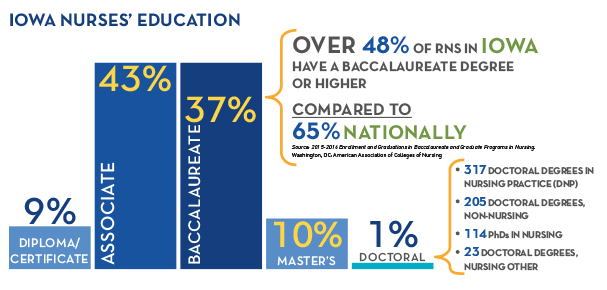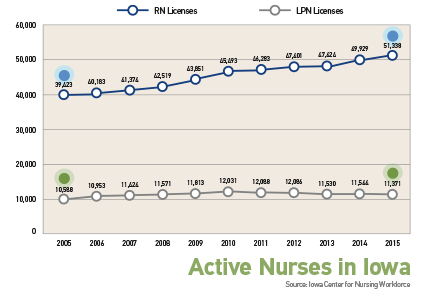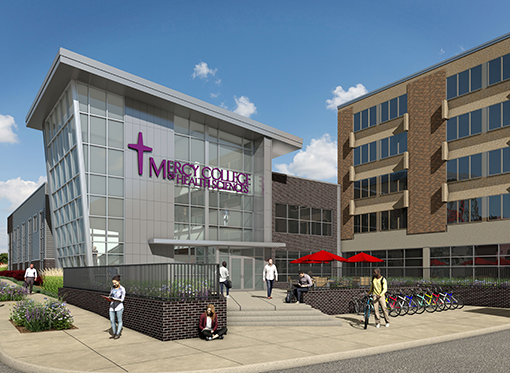Preparing the next generation of nurses
Mercy College to launch several new degree programs in fall 2018

JOE GARDYASZ Nov 21, 2017 | 5:00 pm
9 min read time
2,156 wordsBusiness Record Insider, Health and WellnessAs construction crews are busy building more classroom space at Mercy College of Health Sciences, the college’s School of Nursing is gearing up for some significant program additions beginning next fall.
The Des Moines-based college, which three years ago added a Bachelor of Science in Nursing program to its curriculum, now plans to launch an accelerated BSN program that will enable candidates who already have an undergraduate degree to earn a baccalaureate nursing degree in 12 months.
The new program is geared toward meeting the needs of health care systems seeking more bachelor’s-level trained nurses, as well as increased demand from people wanting to pivot to the nursing field.
Also, as part of a nationwide move to enhance the education of nurse practitioners, the School of Nursing plans to launch a Doctor of Nursing Practice degree program in fall 2018. Pending approval by the Higher Learning Commission, the three-year program will offer three DNP specializations: family nurse practitioner, psychiatric mental health nursing practitioner, and organization and systems leadership.
“So we are entering the field of graduate education at Mercy College for the first time, and we are very excited to offer doctoral education,” said Nancy Kertz, dean of the School of Nursing at Mercy College. The program would join six other DNP programs that have been launched in the state over the past several years.
Mercy College’s School of Nursing — whose 417 nursing students make up just over half the total enrollment of the college — is the largest undergraduate nursing program in the state, and a large source of nursing talent for health systems in Greater Des Moines. According to a survey of its nursing students, upwards of 80 percent intend to work in Iowa after graduating, and of those, about half plan to stay in the metro, Kertz said.
Unfilled openings across the state
A watershed report in 2010 by the Institute of Medicine drove home the importance of raising the education levels of nurses, citing a number of scientific studies that show higher education correlates with better patient outcomes. The report called for 80 percent of the U.S. nursing population to obtain a bachelor’s or higher degree in nursing by 2020.
At the time of the report, only about 27 percent of Iowa nurses had a BSN or higher; seven years later that number has increased to 47 percent, said Laura Hudson, associate director of the Iowa Board of Nursing. The statewide goal is for 50 percent of Iowa’s nurses to attain a BSN or higher. In 2015, the number of nurses graduating from BSN programs in Iowa increased by 11 percent from the previous year.
“The market is driving that a bit, too,” she said, noting that a number of health systems are posting positions that give preference to or require the BSN degree.
Hudson, who compiles the data for the annual trends in the nursing report, said in the past couple of years nursing shortages have been observed in some pockets of the state, but now shortages are being reported more widely across Iowa.
“When I’m out visiting with (members of) the Iowa Organization of Nurse Leaders, all of them are saying there are openings that they can’t fill,” Hudson said.
Before speaking to the Business Record by phone, Hudson tallied up hundreds of Iowa nurse positions posted online by various health systems and jobs boards. UnityPoint Health, for instance, had 345 nurse openings posted, including 109 in Greater Des Moines. Mercy Health Network had 133 nurse openings she counted, while the University of Iowa posted 123 nursing jobs.
“What we are lacking — and it’s not unique to Iowa — there is no single source of demand data for nurses in Iowa, so it’s a guessing game,” Hudson said. “Do we or don’t we have these shortages?”
Demographic factors — including the effects of retirements by older nurses and whether younger nurses will choose to stay in the profession — also make it difficult to accurately forecast nursing needs.
Statewide, RN nursing program enrollment increased by more than 35 percent between 2005 and 2015, according to the latest trends report from the Iowa Center for Nursing Workforce. In that same period, the number of licensed RNs in the state increased by nearly 12,000, or 30 percent.
However, nearly 45 percent of RNs in Iowa are 50 or older, and 36 percent of LPNs are 50 or older, according to the latest report, which covers 2014-2015. The 2015-2016 report is still in production.
Several forecasts project that as nurses age out of the workforce in Iowa, graduation rates should keep up with the demand, Hudson said. “However, when we look at those workforce studies, they are assuming supply and demand are equal, and we know right now based on the current workforce environment that’s not true. We have a deficit right now, as evidenced by the job postings out there.”
Additionally, changes in preferences for work-life balance are changing how many nurses, particularly younger millennials, are approaching their careers. Some are no longer willing to work night or weekend shifts, and in some cases nurse leaders have tried to respond with creative work schedules, Hudson said.
Some health systems’ residency programs, such as the online nursing residency program at University of Iowa Hospitals, provide new nurses with additional support, mentoring and education in their first year. “We do see that is helping,” she said, “and any nurse residency program helps with retention.”
An accelerated option
Mercy College rolled out its Bachelor of Science in Nursing program in fall 2014, in response to the nationwide push sparked by the Institute of Medicine report.
The inaugural BSN class at Mercy College graduated in August 2016, and the School of Nursing currently has 324 BSN students enrolled. The program now has a fairly steady enrollment of about 100 students each fall and 80 students each spring.
“We thought initially that once the BSN program was up and running, the associate degree program would be closed,” Kertz said. “But due to the extreme nursing shortage and interest in the ASN, we decided to keep that program, and we transitioned it to a part-time, evening/weekend model.”
Mercy College surveys its nursing students at graduation and between six and nine months after graduation. In the past year, “over 50 percent of our students have had a job offer at the time of graduation, and over 80 percent of graduates after nine months are employed in their discipline,” she said. “The number could be as high as 95 to 100 percent, but some students we just lose track of and can’t verify.”
Mercy College has seen declining enrollment for its RN-to-BSN program, which is something it didn’t anticipate. The trend might be partly attributable to more competition from online courses being offered, Kertz said.
Similar to demand for its ASN program, the new accelerated BSN program is expected to be popular with midcareer adults looking to get into a new field. Mercy College plans to accept up to 36 students for the inaugural class next fall.
“We get a lot of requests for this type of program,” Kertz said. “People will call and they’re looking for nursing as a second career; they don’t necessarily want to start at the beginning. They want to have that advanced placement, so to speak. So it’s partially by request, but partially by the need, the market demand for nurses.”
In conjunction with the accelerated BSN, Mercy College will partner with Drake University for a 3+1 program in which Drake students can get a bachelor’s degree in three years and then transfer to the nursing school to complete the BSN.
“Other students have expressed interest in that 3+1 program, so we will offer that to our own health sciences students as well,” Kertz said. “But the initiative came through conversations with Drake.”
“We also have submitted to the Iowa Board of Nursing an interim approval for a paramedic-to-BSN program,” said Kertz, noting that this would be the first program offering of this type in the state. “We don’t have that full approval yet, but once we receive approval with the full proposal, we hope to also launch that in fall 2018.”
Beyond the master’s level
The new Doctor of Nurse Practice degree will prepare nurses who have a BSN to diagnose, assess and treat patients, and prescribe medications, comparable to the training that someone would receive in a master’s-level program. The DNP, which will be a three-year, full-time program, will offer more intensive study in leadership, finance and business, Kertz said.
“With the nurse practitioner role, there is that push to have the Doctor of Nursing Practice as that entry-level degree for advanced nursing practice,” she said. “There are master’s-level programs out there, but the push is to offer it at what we call the DNP level. … We anticipate that with the changes in health care there will be an increased need for nurses with the Doctor of Nursing Practice degree to be out in the community, to be based in clinics, and in hospital settings as well.”
Additional staffing
While many nursing education programs are experiencing faculty shortages, Mercy College has been “very blessed, in that at least since I’ve been here, we’ve been able to fill our positions with qualified faculty,” Kertz said. “As a result of that, we are able to maintain our numbers and can continue to grow. That is of just huge importance for us.”
With the accelerated BSN model, “we’ll certainly need a few additional faculty for that program,” she said. “We will certainly have an increased need for faculty with the DNP program. And of course, these faculty members must have a doctoral degree and they must also hold certification in their area of teaching specialty in terms of the ARNP role.”
The Iowa Board of Nursing, the state board that regulates the nursing profession, has given preliminary approval for the DNP program; full approval would follow a site visit after the program is up and running.
Mercy College has also sent a request to the Higher Learning Commission, which accredits degree-granting postsecondary educational institutions in Iowa, and is waiting for a date to be set for a site visit. Because Mercy College’s BSN program is already accredited by the Commission on Collegiate Nursing Education, the DNP will be considered as a new degree under that accreditation, with just a site visit required, Kertz said.
Given these new programs, does Kertz expect a healthy bump in nursing student enrollment?
“I believe so. I think our DNP program will certainly increase the number of nursing students that we have,” she said. “Many programs are turning away students for the advanced practice, so we would be the first face-to-face cohort Doctor of Nursing Practice program in Des Moines, so we’re very excited about that.”
College Hill offers downtown apartments for students
There’s a vibe that only on-campus housing can give, and it’s a particularly cool feeling when it’s located downtown with views of the Capitol and Wells Fargo Arena. Mercy College of Health Sciences is putting the finishing touches on approximately 80 units of student housing across from its campus.
The College Hill apartments, located on the second through fifth floors of 921 Sixth Ave., are owned and managed by College Hill Associates L.P. The newly remodeled apartments range from studio to two-bedroom units, with furnished and unfurnished options. Renovation work by Ball Team Construction LLC is continuing, and the management company plans to make additional units available this winter.
“There have been requests for a long time from students, especially from families of students who have come from longer distances than Iowa who just want to have their family members near campus,” said Jim Tagye, director of marketing communications for Mercy College. “We’ve had limited availability with what used to be called Mercy Court. Now there are expanded, updated options that students are more willing to take advantage of.”
The new housing is part of a campus renovation project that includes new offices and meeting rooms for the admissions, financial aid, registrar and student success employees, along with the recently dedicated Josephine Norkaitis Student Success Center that will be used for student testing and tutoring.
The second phase of the renovation, which is still underway, includes a new two-story, 20,000-square-foot building that will have additional classroom, lab and simulation space, plus 20,000 square feet of completely remodeled space on the garden level and first floor below the College Hill apartment units.
Nancy Kertz, dean of the School of Nursing, said she’s excited about the housing as a further draw for students.
“There are students in rural areas who would like the Mercy College experience; it’s an avenue for them to live close by,” she said. “The other wonderful advantage is having a new facility with new nursing classrooms, new nursing laboratories and simulation rooms. We’re very excited.”











